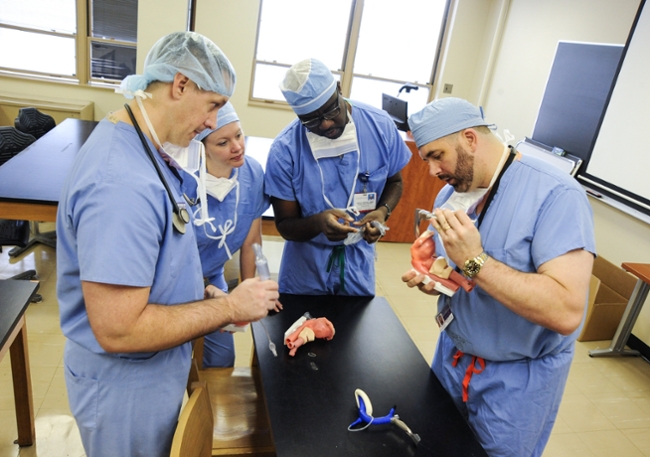University to Offer Doctor of Nursing Practice Degree

The University of Scranton announced it will now offer its second doctoral degree – a doctor of nursing practice (DNP). Offered through an innovative “executive format,” Scranton’s DNP prepares students to excel in the increasingly demanding field of nursing.
In a model designed to accommodate fulltime practice, students enrolled in Scranton’s 30-credit program will take two courses per fall and spring semesters, meeting over one weekend per month for four times each semester. Two courses will also be taken during the summer between the first and second years of the two-year program.
According to Mary Jane Hanson, Ph.D., professor of nursing and director of the graduate nursing program at the University, the DNP program will better prepare advanced practice nurses to respond to the demands of an evolving health care system and meet the changing needs of patients.
“While many DNP programs are offered online, we are excited to offer our DNP program in this unique weekend executive model format,” said Dr. Hanson. “This format will allow for increased collaboration among students and monthly face-to-face contact between students and professors, thus enriching the academic experience and facilitating direct access to faculty and advisors on a regular basis.”
“As part of the University’s ongoing commitment to graduate education, we are proud to offer an innovative doctor of nursing practice degree that provides an exceptional advanced education in nursing while allowing the region to benefit from the scholarly work of our students and faculty,” said University of Scranton President Kevin P. Quinn, S.J.
The program requires DNP students to complete an evidence-based scholarly project that has the potential to positively change health care delivery and improve patient outcomes for vulnerable patients, families, communities or populations. In addition, each student will complete clinical hours related to the project.
“In keeping with our Jesuit tradition of educating men and women for and with others, the scholarly component of this doctoral program intentionally focuses on the needs of vulnerable populations,” said Debra Pellegrino, Ed.D., dean of the Panuska College of Professional Studies, which houses the University’s other doctorate program in physical therapy (DPT).
“Research advances in nursing and health care continue to be made every day. Experienced and educated practitioners are needed to evaluate and translate this new knowledge into clinical practice to improve patient outcomes,” said Dr. Hanson. “Our DNP program provides graduate education in a learning environment where ethical leadership, creative problem solving, service to patients and communities, inter-professional teamwork, appreciation of diversity, and commitment to performance excellence are the hallmarks.”
The program will position graduates well for the changes and opportunities that are expected to arise for health care practice in the future, including advancement in independent practice, leadership positions in a variety of practice settings, executives in health care organizations, directors of clinical programs, faculty positions responsible for clinical program delivery, and teaching in the clinical setting.
The University is now accepting applications for DNP enrollment in the fall semester of 2015. Advanced nursing practice students will be given credit for the clinical hours completed in their master’s specialty program and will complete additional hours to fulfill the 1,000 clinical hours total required for the DNP program. Applicants must possess a master’s degree in nursing with preparation and certification in an advanced nursing practice specialty and be licensed as a registered nurse in Pennsylvania, among other requirements.
The University will host a free iformation session for its graduate nursing programs at 6 p.m. Wednesday, Oct. 15, in McGurrin Hall. Walk-in visitations for one-on-one advising can be made between 4-6 p.m.
For additional information, contact Graduate Admissions at 570-941-4416.






